Thu, 25 Sep 2014 . Last updated Thu, 25 Jun 2015 08:50
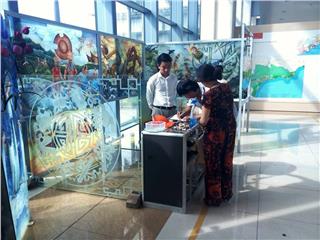
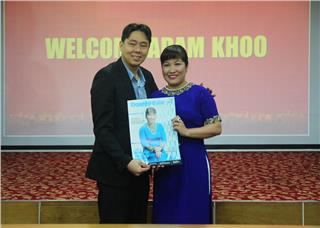

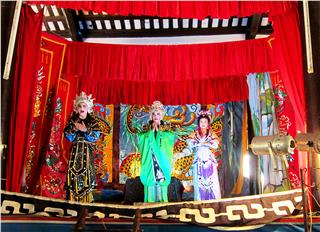



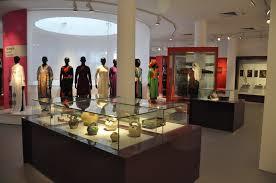
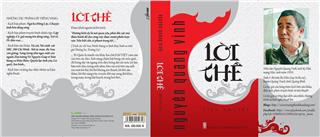
Some insects recently were discovered by a group of many scientists, led by Doctor Luca Bartolozzi. He is the leading entomologist at the Museum of Natural History under the University of Florence. This is the biggest natural history museum in whole of Italy and one of the biggest museums in the world.
We have known a small part of creatures living around us. Insects share two third of creatures living on the earth. We know maybe one tenth of insects living on the earth. So there are a lot of things to do, especially in tropical countries which are so rich of insects. Lucanus planeti is the common insect living in Tam Dao. There are about 1700 species in the planet.
When you speak about insect with somebody, the first reaction of them is negative. They think that insects are ugly and dirty. Many people connect the name of insects with cockroaches, flies, mosquitoes. But they are a very small part of the insect world. There are lots of wonderful insects as butterflies. Insect play role important in food chain in nature connected each other. The food is broken, the ecosystem is collapsed. So, it is very important to save insect. Insect have amazing capability. Camouflage helps them survive in nature.
When he came to Vietnam, he was very curious about the creature world here. He was impressed by the diversity of insect world in Vietnam. The region has very long country form North to South. The biodiversity of Vietnam is very big because of diverse climate, humidity, rainfall and vegetation. The world of insects is always connected with the environment. If the environmental condition changes, also the species living there will be changed. His job is to discover the connection between the ecosystem and insect and he discovered insects in every part of Vietnam.
There are many hot spots of biodiversity around the world. Every hot spot has its own characteristics. For example, the in Vietnam is very rich compared to other countries and regions. So Luca was very excited to visit Vietnam and to find out this family. In Italy, there are around 20.000 different species of insects. Likely Vietnam, it has long country, but Vietnam is a tropical country. So the main difference is that Italia has winter and cool winter. It is very bad because insects do not like cool. That is the reason why tropical countries have much more species of insects. He estimates that Vietnam has ten times more species than Italy.
On the trip in Cuc Phuong National Park, Luca bartolozzi and his partners spent two day collecting the many species of insects in the forest. The day time collecting was done by using trap and net. Like picking insects on the trees, leaves and flowers by hand, he spent hours searching and founding insects and then took way for the study. These insects will be stored and preserved for the study by the entomologists when they return Italy. They were separated different species in different jars and sent to specialists around the world to identify them.
After the first memorandum of understanding between the Museum of Natural History of Florence University and the Vietnam Natural Museum dedicated expedition work in the northern part of Vietnam in 2010, the second and third were also agreed to extent the work the Central and the Southern region of Vietnam. With that in mind, these entomologists had to stand the tropical climate and terrestrial leeches and mosquitoes as they gathered as much information about the Vietnam biodiversity as possible. These challenges cannot prevent them from devoting their time to expedition work.
During the expedition, specialists emphasize to learn about some groups of flying insects. So they used Malaise traps and the night trap to get up flying insects. But working in the tropical forest, so rain can have anytime making the work affected. With their passion in entomology, Dr. Luca Bartolozzi and his partners return to Vietnam every year for expedition. And they will continue studying the biodiversity paradise to gain better understanding of the tropical world of insect.
The Vietnam National Museum of Nature under the Vietnam Academy of Science and Technology plans to sign new memorandum of understanding with the Natural History Museum under the University of Florence in 2016 to expand the field of researching to other areas beyond entomology. Founded in 1775, the talented museum is one of the biggest museums in the world and currently holds over 8 million different artifacts. Dr. Luca Bartolozzi was the main speaker in the seminar titled “Exploring Vietnam the biodiversity insect”, the audiences were none other than his friends and colleges. Dr. Bartolozzi presented some results of four his trip conducted in 2010 to 2013 to study insects in Vietnam. Though short, the professional presentation impressed on the audiences.
Vietnam is one of the 16 hot spots in biodiversity in the world. Talking about insects, Vietnam is recently home to 10.000 species. Many found in primary and secondary forests. Scientists estimate, there are actually over 50.000 species, the majority of which remains reach undiscovered due to shortage of researches. Many insects in Vietnam are listed in the IUCN Red Book as well as the specie in convention on international trade in danger species wild flora and fauna. Scientists have warned that many insect species must go extinct due to forest destruction even before they can be discovered and named.
There are over 900.000 insect species known to the world. This number is small compared to those that are still undiscovered. It is estimated that there are 20 to 30 million different insect species. Harmful insects account for a very small percentage of them, about 0.1%. The rest are beneficial or harmless insects. For example, according to statistics from 2009, the total economic value of crop pollination by insects amounted to 153 billion Euros worldwide. About 75% of all crops rely on insect pollination. The most thing is to preserve the eco-system and the natural habits of insects which include forests.
In Vietnam, the main problem is the growth of population, the need of the agricultural land, the need of wood. The only solution is to protect the natural area as much as possible. Eco-tourism benefits locals. Conversation efforts in Vietnam are complicated compared to European countries. For generations now, the daily life of many Vietnamese has depended on the forests from hunting to gathering and collecting wood to build houses. As the economy develops, the demand for forest products increases. As Luca said, Vietnam should develop eco-tourism for the benefit of the local people. People living inside or near conversation areas should be allowed to offer eco-tourism products. That way, they will see that forest protection can become their livelihood. If they destroy the forest, their livelihood will be gone. Hopefully, people will pay more attention to the natural world around them and the biodiversity of Vietnam.
Source: VTV4 – VTV.vn

 Đặt vé máy bay cho người Việt?
Bấm vào đây
Đặt vé máy bay cho người Việt?
Bấm vào đây
Our service uses cookies for technical, analytical and marketing purposes. See our Cookie và Privacy policies for more information. If you agree to this, just keep browsing.


